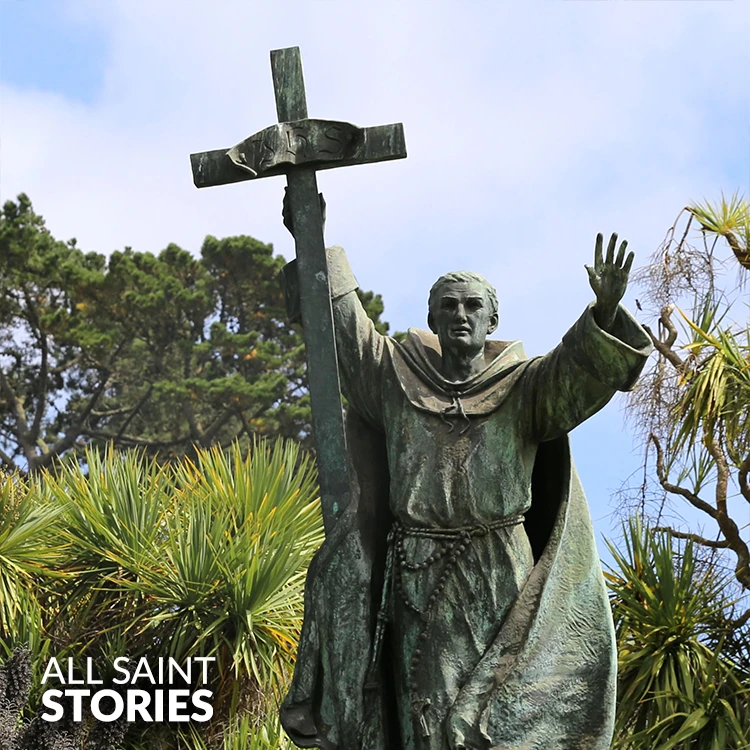St. Junípero Serra, you brought the Gospel to distant shores and labored with courage and compassion. Help us to be missionaries of faith in our daily lives. Inspire us to proclaim Christ with zeal and to love all people with a humble heart. Amen.
ST. JUNIPERO SERRA
ST. JUNIPERO SERRA

St. Junípero Serra was a Spanish Franciscan missionary who founded many missions in California and played a vital role in spreading Christianity among Native Americans in the 18th century.
St. Junípero Serra was born on November 24, 1713, in Petra, on the island of Mallorca, Spain. He joined the Franciscan Order in his youth and became a noted scholar of philosophy and theology. Despite a promising academic career, Serra felt a deeper call to missionary work and left for the New World in 1749, arriving in Mexico after a perilous journey.
In New Spain, Serra spent nearly two decades evangelizing among the indigenous peoples of Mexico before being assigned to mission work in what is now California. Beginning in 1769, Serra founded the first of nine Spanish missions along the California coast, including the famous Mission San Diego de Alcalá and Mission San Carlos Borromeo de Carmelo. These missions served not only as religious centers but also as places of agriculture, education, and trade.
Serra traveled hundreds of miles by foot through rugged terrain and faced immense challenges including illness, political resistance, and logistical hardship. Despite his physical suffering—he had a chronic leg injury—he remained committed to his mission. He baptized thousands of Native Americans and introduced them to Christianity, European agricultural techniques, and structured communal living.
Serra’s legacy is viewed in different lights. While he is honored for his missionary zeal and care for native peoples, modern critics have examined the colonial system he represented, which often resulted in cultural suppression and hardship for indigenous communities. Nevertheless, Serra personally advocated for better treatment of Native Americans and defended them against abuse by colonial soldiers and officials.
Pope Francis canonized Junípero Serra on September 23, 2015, during a visit to the United States. He praised Serra's missionary courage, holiness, and commitment to the Gospel.
Video Not Found
The information on this website is compiled from various trusted sources. While we aim for accuracy, some details may be incomplete or contain discrepancies.
If you notice any errors or have additional information about this saint, please use the form on the left to share your suggestions. Your input helps us improve and maintain reliable content for everyone.
All submissions are reviewed carefully, and your personal details will remain confidential. Thank you for contributing to the accuracy and value of this resource.
Credits & Acknowledgments
- Anudina Visudhar (Malayalam) – Life of Saints for Everyday
by Msgr. Thomas Moothedan, M.A., D.D. - Saint Companions for Each Day
by A. J. M. Mausolfe & J. K. Mausolfe - US Catholic (Faith in Real Life) – Informational articles
- Wikipedia – General reference content and images
- Anastpaul.com – Saint images and reflections
- Pravachaka Sabdam (Malayalam) – Saint-related content and insights
We sincerely thank these authors and platforms for their valuable contributions. If we have unintentionally missed any attribution, please notify us, and we will make the correction promptly.
If you have any suggestion about ST. JUNIPERO SERRA
Your suggestion will help improve the information about this saint. Your details will not be disclosed anywhere.
© 2026 Copyright @ www.allsaintstories.com







 English
English
 Italian
Italian
 French
French
 Spanish
Spanish
 Malayalam
Malayalam
 Russian
Russian
 Korean
Korean
 Sinhala
Sinhala
 Japanese
Japanese
 Arabic
Arabic
 Portuguese
Portuguese
 Bantu
Bantu
 Greek
Greek
 German
German
 Dutch
Dutch
 Filipino
Filipino